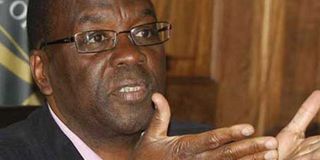Why Supreme Court is the new IEBC for political elite

Chief Justice Willy Mutunga. The expected retirement of Chief Justice Willy Mutunga in June next year has opened for the vested interests just the kind of window they needed to move in and manage the succession. FILE PHOTO | NATION MEDIA GROUP
What you need to know:
- In the eyes of the political elite, the Supreme Court became the new IEBC — the last bastion to capture and control in the war for supremacy.
- The expected retirement of Chief Justice Willy Mutunga in June next year has opened for the vested interests just the kind of window they needed to move in and manage the succession.
The electoral commission has in the past been the centre of attention in the countdown to a General Election, with the political elite angling for the slightest opportunity to staff it with their people.
A similar scenario is likely to play out in the pre-election sparring ahead of 2017, despite the fact that the majority of the commissioners at the Independent Electoral and Boundaries Commission (IEBC) won’t see their terms run out until after the next election.
The prospect of a grudge match between the Opposition coalition Cord and Mr Ahmed Issack Hassan, the IEBC chairman, over his perceived role in influencing the outcome of the last election is particularly mouthwatering.
Yet Mr Hassan and his IEBC team could still survive this one without much drama.
For Kenya’s institution raiders are forever out to bend everything to their political will, the pre-election battleground has long shifted from Anniversary Towers, the electoral commission headquarters, to the old colonial-style court building in Nairobi.
To be precise, the ground shifted on March 30, 2013, the day the Supreme Court delivered its judgment on Raila Odinga’s petition challenging the election of Uhuru Kenyatta as President.
In the eyes of the political elite, the Supreme Court became the new IEBC — the last bastion to capture and control in the war for supremacy.
Although the Supreme Court’s mandate is not limited to presiding over presidential petitions — it also adjudicates a wide range of other disputes involving constitutional interpretation and application — the political elite and other vested interests have largely come to consider it a sort of tool in their hands to use for electoral advantages.
VESTED INTERESTS
President-elect Kenyatta infamously remarked that they were waiting for “some six people to decide” while the petition against his election was before the court, prompting him to later clarify that he had not meant to disrespect the judges.
But the high importance attached to the court in electoral disputes explains the many vultures currently circling over it.
The expected retirement of Chief Justice Willy Mutunga in June next year has opened for the vested interests just the kind of window they needed to move in and manage the succession.
It is tempting to read an engineered crisis in the conflict between the Judicial Service Commission (JSC) and the Supreme Court.
If the JSC succeeds in forcing out two judges on account of their having attained the age of 70, there will only be four judges remaining at the Supreme Court — one short of the five required for a quorum — by the time Dr Mutunga retires in June.
If the JSC were to have three more fired on the basis of a petition filed by Apollo Mboya, the Law Society of Kenya CEO, only one judge will be left standing.
By the time the 2017 elections come, the entire Supreme Court will have been reconstituted. The political elite never waste a good crisis.





